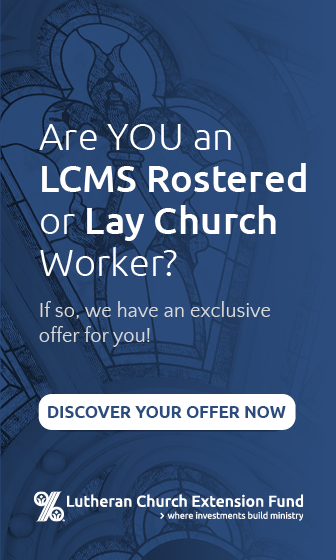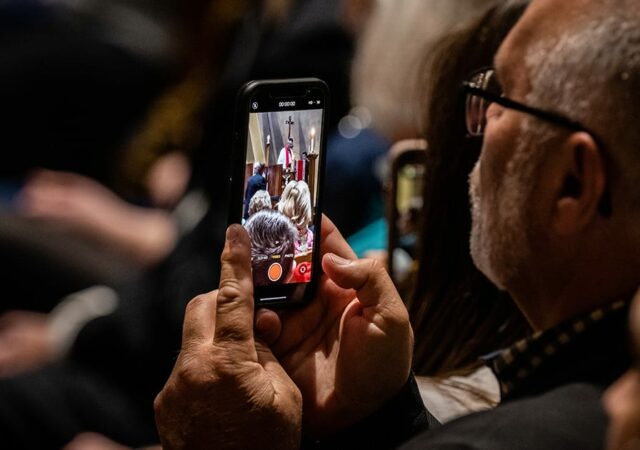During the four days of the LCMS Council of Presidents (COP) retreat Feb. 18-21 in Phoenix, the council spent the bulk of its time applying the concept and principles of the “Koinonia Project” to difficult issues in the church.
The Koinonia Project is an initiative by the Office of the President of the Synod designed to foster theological discussion under the Word of God to bring greater unity to the Synod’s “Life Together” on contentious topics. It grew out of the Synod’s 2007 convention-mandated Task Force on Synodical Harmony appointed by the COP and the LCMS Board of Directors. The Koinonia Project enfolded the suggestions recommended by that task force into this present effort.
With all members of the COP participating in one of three randomly selected groups, each group spent significant time identifying and beginning to work through an issue faced by the Synod (varying points of view being present within the membership of the groups). Discussions by these groups will continue each time the council meets until its April 2015 meeting.
The participation of the Council of Presidents in the Koinonia Project is in keeping with Resolution 3-01A, which was adopted at the 2013 Synod convention.
Synod First Vice-President Rev. Dr. Herbert C. Mueller Jr. led the retreat, explaining how it was designed to work. He recalled how the “Koinonia” concept has taken root within the Synod, underscoring that it is the living Lord Jesus who brings about true fellowship among Christians.
The council conducted its business meeting on Friday morning of the retreat, receiving a report from its Clergy Call and Roster Committee that included:
- revisions of two COP documents — “Guidelines for Dealing with Bankruptcy Involving the Ordained Ministers of the LCMS” and “Guidelines for Dealing with Bankruptcy Involving the Commissioned Ministers of the LCMS.” The revised documents are titled “Guidelines for Dealing with Credit & Financial Difficulties Involving Ministers of Religion — Ordained of the LCMS 2014” and “Guidelines for Dealing with Credit & Financial Difficulties Involving Ministers of Religion — Commissioned of the LCMS 2014,” respectively. The revised documents will be presented again for proposed approval at the COP’s April meeting. After they are approved, district presidents will see that the documents are distributed to rostered workers, along with a cover letter.
- information that the Concordia Plan Services section of the Supplement to the Diplomas of Vocation of the call documents for rostered workers will be modified, effective July 1, to reflect the removal of the 3 percent offset payment requirement to rostered church workers who are currently participating on the Regular Basis of the Concordia Retirement Plan. A letter explaining the change is being mailed in late March to all employers with Rostered Workers on the Regular Basis. A separate letter is being sent in early April to the individual rostered workers.
- complimenting the January Reporter “Pressure Points” column about the misuse of the Internet for pornography while requesting its author to expand on the topic to include information about the role of district presidents in assisting LCMS church workers and congregations in addressing the issue. The April “Pressure Points” that provides such information is here.
- progress being made on guidelines to assist congregations with policies for prevention of sexual abuse.
- progress being made on a comprehensive review of the Council of Presidents Policy Manual, with the Clergy Call and Roster Committee to serve as the final reviewer of the revised manual on behalf of the council.
- a brief update on the ongoing appeals status of a ruling by a Wisconsin judge that challenges the IRS provision of a clergy housing allowance.
The COP also approved first-call placements of 15 ordained and 32 commissioned ministers, reinstated the Synod roster memberships of one ordained and eight commissioned ministers, provided 11 assignments to seminary vicars and approved 12 requests for extensions of non-candidate status. One retired pastor, upon approval of the Colloquy Committee for Pastoral Ministry, was accepted into the Synod as an emeritus member.
The council received a report from Synod President Rev. Dr. Matthew C. Harrison regarding his recent visits to Kenya, Ethiopia, Ghana, Madagascar and Germany. He also spoke of the Synod’s financial report, seminary matters and progress being made to open an office in Washington, D.C.
In keeping with the Bylaw requirement that the Council of Presidents and Board of Directors determine the boundaries of the five regions of the Synod 24 months prior to the next convention, LCMS Secretary Rev. Dr. Raymond Hartwig presented a proposal to the council to retain the same delineation of regions as was used in preparation for the 2013 convention. This proposal was adopted — as also adopted by the LCMS Board of Directors during its Feb. 14 meeting.
With 33 districts reporting, 311 congregations are currently calling sole pastors, 34 are calling senior pastors and 73 are calling associate or assistant pastors — totaling 418. Six new congregations have been started since the last report and eight congregations were closed.





The March 27 Reporter article, “COP applies ‘Koinonia Project’ to church issues,” finally provides information on the Koinonia group meetings conducted by the COP during their “retreat”, February 18-21 (Tue-Fri), in Phoenix, AZ. Eliminating the boilerplate, and descriptions of activities conducted at their Friday morning business meeting, here is the pertinent text of the COP Koinonia group activities and their accomplishments:
“With all members of the COP participating in one of three randomly selected groups, each group spent significant time identifying and beginning to work through an issue faced by the Synod (varying points of view being present within the membership of the groups).”
That’s it for two days of 35 district presidents and an assortment of synod officers, assistants, and other support people — “significant time identifying and beginning to work through an issue…”
And that’s after nearly a dozen draft plans, three conventions, and a synodical Koinonia project webpage.
Well, the Reporter notes there will only be four more (“until April 2015”) of these COP Koinonia group discussion meetings. So it’s unlikely the COP will solve all (or any of) the heterodox problems in the LCMS (or, evidently from the excerpt, in the COP) before April 2015.
Perhaps the Koinonia project should have been contracted out to the ACELC, for less money, less time, and more Koinonia in the Missouri Synod.
My questions regard the COP “…applies ‘Koinonia Project’ to church issues…” during the four day COP retreat.
What issues “faced by the Synod” did the COP identify? Which of these issues did the COP begin to work through?
The report says that “Discussions by these groups will continue…until April 2015.” If, as indicated above, the “theological discussions [will take place] under the Word of God” why will the discussions continue for a year? Are some of the identified issues not addressed in God’s Word?
What fruit does the COP expect to bear as a result of discussing the issues for a year? Does the COP expect to resolve any of the issues being discussed? How will the resolutions be implemented?
Thanks for clarifying this.
God’s Blessings in Christ Jesus,
Ginny Valleau
Independence, MO
My question respecting the Koinonia Project’s plan is to ascertain what specific mechanism is or will be in place to actually resolve the issues once they are identified? Discussion is not an end in itself, but a means to an end. How will we know when the Koinonia Project is completed? The Formula of Concord process took less than a year from beginning to end. Why is it taking a year simply to formulate what the issues are that are divisive among us? Frankly any Winkle conference could do that in about an hour and a half. We’ve been dealing with the same issues for decades so its really not a mystery. Suggest you check out the work that has already been done by the ACELC on their website: http://www.acelc.net. They’ve already identified 10 issues that may be of help in expediting the process.
2013 Synod Resolution 3-01A directed the President of the Synod to divide the members of the Council of Presidents by random draw into three groups to work as three theological study groups according to the principles outlined in the Koinonia Project Concept Paper available at – http://www.lcms.org/page.aspx?pid=1041
Fruitful theological study, especially when there is some level of disagreement, is never easy. However, each of these three groups is digging into issues about which there is not full agreement across our Synod. Our purpose is to understand clearly what is the source of any disagreement, and to help one another hear and confess the Word of God clearly in the matter. We are not at the present time able to say anything more specific than what was summarized in the article above. We have to take the time both to hear each other and, even more importantly, to study God’s Word so that the Word may have its way with each of us.
The Council of Presidents is committed to the discussion at least through April 2015, when the terms of the present executive committee come to an end. At the April 2015 meeting the Council will hold internal elections and will need to evaluate this effort at that time. Our hope and prayer is that this effort will ultimately bear fruit in greater harmony and agreement in our confession of Christ in our midst and before the world.
Resolution 3-01A states: “Resolved – that to lead by example and to demonstrate to the entire Synod that this project can bear fruitful fruits, the President of the Synod be directed to divide the elected presidents of each district and the vice-presidents of the Synod into three study groups who will, by random draw, study koinonia together, with progress of each study group reported on the newly developed web site.”
As these groups make progress, such fruit will be reported at the appropriate time, namely when groups are in a position to report something substantive. At the moment, we have, I believe, made a good beginning and so we covet the prayers of all members of the Synod for this effort.
Yours in Christ’s peace,
+ Herbert Mueller
First Vice President
The Lutheran Church – Missouri Synod
1 Corinthians 1:9-10
I think it bears repeating, since the question was avoided in the response From Rev. Mueller (and I have scanned the concept paper) What specific issues are being discussed? We have so many that face the synod and as a lay leader it becomes frustrating that it appears we simply discuss problems….create a task force….and then elect a new regime (word used purposefully)and then start all over. How can we successfully engage the laity of our congregations when our leadership appears to not even agree on our issues. The word fellowship was highlighted several times in the concept paper….but It appears to me that our fellowship is at a dreadful state. From the prospective of the laity (of which I represent) it appears like we spend a great deal of time and resources on talking about things, but a precious little amount in actively engaging on church members in way they can use their respective places in God’s kingdom to outreach to the lost. We are not raising our laity up to use their gifts for kingdom growth properly within their vocations. Sadly…..if the current mindset in leadership continues, we will have little left in the LCMS to worry about.
Dear Vice President Mueller,
Thank you for your response. Please know that the prayers for a final resolution of the issues that are clearly dividing our Synod do ascend on behalf of the Koinonia Project and any other efforts that strive for greater unity in our Synodical doctrine and practice.
Can you tell me when the 10 year time frame for completing the Koinonia Project actually begins? Is it after the pilot projects are done and evaluated and a final draft of the Koinonia Project proposal is adopted by the Synod in convention?
Again, is there going to be some kind of mechanism/statement that indicates when each issue is finally resolved and when will you know the process is complete?